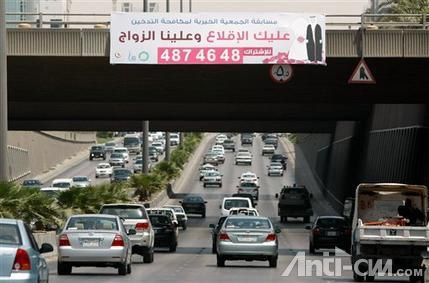|
|
Saudi anti-smoking campaign targets young grooms
http://hosted.ap.org/dynamic/stories/M/ML_SAUDI_GROOMED_TO_QUIT?SITE=AP&SECTION=HOME&TEMPLATE=DEFAULT&CTIME=2009-06-29-06-56-30
Jun 29, 6:56 AM EDT By DONNA ABU-NASR

Cars pass under a banner that carries the slogan, "Kicking the habit is on you, and marriage is on us." in Riyadh, Saudi Arabia, Sunday, June 28, 2009. The slogan refers to an anti-smoking campaign that will reward 20 young grooms who successfully complete a rehabilitation program to quit smoking with furniture for their homes. Hundreds of men have applied, but some have objected to the campaign because they feel it demeans women.
The catchy slogan, "Kicking the habit is on you, and marriage is on us," is meant to entice young grooms to give up smoking by offering an attractive incentive.
And, indeed, hundreds have expressed interest in the first anti-smoking drive of its kind in the kingdom, with one man saying he is ready to take up smoking just to be eligible for the grand prize - an all-expenses-paid wedding.
In much of the Arab world, the groom alone bears the cost of getting married, including an expensive party, a dowry and a fully furnished house. Men often put off marriage until they've saved enough money to take a bride.
Several commentators have complained that the campaign is turning women into a commodity, but organizers have taken the criticism in stride, saying they're thrilled to get people talking about the dangers of smoking. About one quarter of Saudi Arabia's 27.6 million residents indulge.
Since June 20, banners have gone up on overpasses and bridges over the Saudi capital's major highways, depicting the campaign slogan in pink and reddish brown. Next to it are the faceless outlines of a bride, dressed in white and carrying a bouquet of flowers, and of a man wearing a black, ceremonial cloak over his white thobe, the traditional robe Saudi men wear.
The quit-smoking-drive is also being advertised in malls, at universities and in magazines.
The organizer, a local charity called Purity, stipulates that the marriage is the man's first and that he has a recent marriage contract. In Islam, the contract is usually signed before a couple moves in together.
A draw on Aug. 6 will include the names of the men who successfully quit smoking in a weeklong course. The winner will have all wedding expenses paid while 20 runners-up will get free furniture.
Sulaiman al-Soby, secretary general of Purity, said the aim is to create a smoke-free family. One-third of Saudi school children live in homes with smokers, according to a 2007 health survey.
Al-Soby said he expects thousands to take part in the campaign, which only covers the capital Riyadh, a metropolis of 5 million.
Ali al-Abdullah, originally from Yemen, said he wouldn't have attempted to quit without the new incentive. The 22-year-old, who is engaged to his cousin, smokes a pack-and-a-half a day, "two when I have problems."
Salem al-Majdali, a spokesman for the charity, said hundreds of men have already applied or called to get more information.
One was the nonsmoker who wanted to take up smoking.
Another wanted to know if the charity also provides the bride. "'Do we get to choose from a bride lineup?'" al-Majdali said, quoting the caller.
Across the Arab world, economic barriers to getting married have prompted charities to jump in. From Gaza to Syria, Islamic groups have arranged mass weddings, to cut down on costs. In Egypt, an Islamic charity affiliated with the ruling party and a pro-government newspaper have provided furniture and appliances to young couples, in addition to collective parties.
In Saudi Arabia, the anti-smoking drive has also attracted criticism.
Some have rejected the link between smoking and what they consider a holy union. Others wanted to know how Purity could start the campaign without the religious blessings of clerics.
Columnist Maha al-Hujailan said the concept is sexist.
"The campaign stems from an idea directed at male smokers: 'Give up having fun with a cigarette and take a woman instead,'" she wrote in the Al-Watan newspaper Sunday.
Another commentator, Suzan al-Mashhady, noted that Arabs have criticized the West for using women to promote merchandise. "Today, we're using ... the same two-in-one method adopted by a hair product that promises to clean the hair and condition it at the same time," she wrote in the Al-Hayat newspaper.
Al-Majdali said many have misunderstood the slogan.
"Did we say we're offering a woman?" he said.
"In any case, the fact that people are discussing the campaign means we have fulfilled our goal of spreading the word about it," he added.

|
Campaign, grooms, Saudi, targets, Young, Campaign, grooms, Saudi, targets, Young, Campaign, grooms, Saudi, targets, Young
|